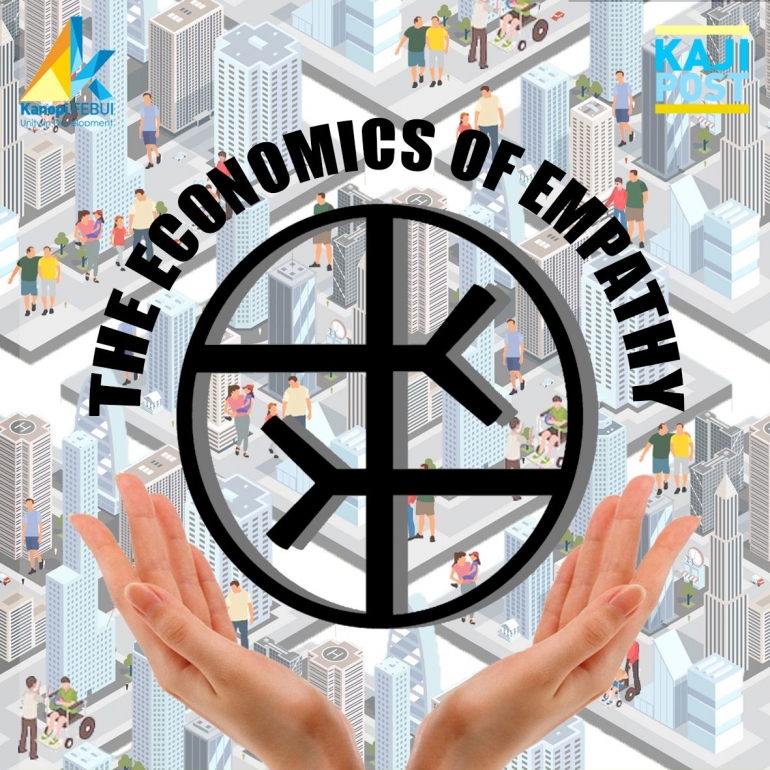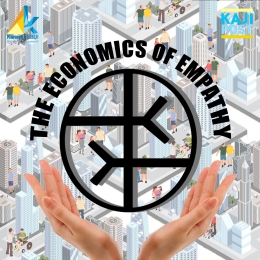"It is not from the benevolence of the butcher, or the baker, that we can expect our dinner but from their regard to their own self-interest." -- Adam Smith, 1776.
It has never been a secret, as mentioned in the quote above, that people make decisions mainly based on their own self-interest -- they tend to choose something that will give them a substantial amount of benefit which will quench their thirst for self-fulfillment. But, humans also have this side of the mental force that makes them realize the value of others, especially in terms of seeing the world in other people's perspective, which is called as empathy.
Empathy is considered to be one of the most important soft skills, especially in top/leading position, as empathy is related to the ability of one person to be able to care for others. In Decety and Lamm's perception (2006), they address empathy in a rather more romantic way in which the experience of empathy is that individuals need to be able to disentangle their own feelings from those of others and the purpose of empathy itself is to soothe the distress of others through compassionate acts, such as helping act.
Although empathy is considered as an act of virtue that will more likely bring more goodness towards the society, especially in terms of economy, it still however raises other questions that put our mind into pondering about the authenticity of the original word of 'empathy' with empathy that we associate with economics since the standard conception of economic agent is seen as a self-interested individual -- that state of mind leads us as well to questions several things such as: does empathy really induce prosocial act from economic agents? Or is it a mere tendency that heavily relies on a specific condition or dependent towards certain context?
Sympathy vs. Empathy
Before we jump in more deeply in discussing about empathy in economics, it's better for us to make clear distinctions between sympathy and empathy as it sometimes can be used interchangeably. Sympathy associates more with the feeling of having concern towards others' condition and sometimes it is considered as a negative emotion since sympathetic feelings are common with the feelings of pity.
On the other side, empathy associates with our nature that put ourselves in the condition of others -- or in other words, trying to put yourself in other people's shoes. Empathy is a feeling that already pass the idea of only having concern towards other people's condition. It has reached the extent of having shared experience where it touches more certain aspect of your life with the others that can trigger you to give immediate response to the specific situation.
In the history of economics, the term empathy is used more as it has been mentioned in one of Adam Smith's opus titled Theory of Moral Sentiments in which he underlined the fact that having empathy is about coming to understand others' inner life by imagining their position in particular circumstances.
The Findings of Empathy in Economics
In economics, the talks about empathy seem to be diminishing a lot since in this century economics has been formalized in a sense that we focus too much on, for example, finding how to maximize anonymous individual's utility and observing interactions that happen in the market. We hardly have a place to talk about the idea of putting those individual's self into others' place which makes the idea of empathy is missing.
However recently, empathy seems to be 'awaken' again in economics' literature through development that arises within specific economics areas that make the idea of having empathy becomes central.
Those economics areas are (1) game theory, (2) welfare economics and interpersonal utility comparison, and (3) the recent talk-of-the-town behavioral economics along with neuroeconomics. In the next discussion, we will go into the first and third economics area since the usage of mentioned areas has been widening in the present-day.
Empathy in game theory plays a major role in the context of determining strategic behavior that will affect decision-making in the process. In game theory, there is a widely-known concept called prisoner dilemma in which it can give a relatively good reference in the use of empathy.
From an experiment done at Learning and Game Theory Laboratory in NYUAD, they conducted an experiment to test whether cooperation prevails in such game and will it (empathy) affect the nature of defect domination that's associated with Nash equilibrium based on empathy questionnaire acquired from IRI (Interpersonal Reactivity Index) scale and also from the game theory-based questionnaire (note that the game taken is a one-shot prisoner dilemma).
The result from this experiment shows that without the consideration of empathy, the domination strategy is the defective one and not the cooperative one. It further emphasizes how the classical game is being played, where eventually it will reach equilibrium at the defective result. On the other hand, when empathy is being considered the result now would be depended on the level of empathy and it turns out that it captures players' preferences better resulting in a higher outcome of cooperation.
The third economics area, which is behavioral economics and neuroeconomics, is particularly interesting since it is considered as a new field of economics that has gained much attention because of its evolutionary finding that combines economic theory with the results from neuroscientific research, and in this sense, will be a helping hand in determining in which area empathy will contribute in economics.
The findings from neuroscientists have proven that there exists empathy in heterogeneous form across experimental subjects (Singer et al, 2006). This heterogeneous form comes from the different degree that each person has in having empathy or we can call it as other-regarding preference. The conclusion that we can get from this claim is that indeed, people are aware and concerned about advantageous outcomes that come from people other than themselves, but this attitude is not consistent in respect of time and individually.
The reason behind it is because as proven by Cialdini et al (1997), the degree of empathy is affected by 'oneness' element in which it will be higher if someone feels empathetic towards those they deem close or at least they know about. This reason has been supported with Singer's discovery of brain activation that shows different empathy degree in respect of context and situation. Another finding behind this trend is because people are more concerned with the well-being of general others rather than specific others known as inequity aversion (Fehr & Schmidt, 1999). Inequity aversion itself is a condition where any deviations from equality will lead to a suffer felt by a person. In this regard, people will feel more empathetic towards the state of the whole population rather than only in terms of the individual.
Why It Matters
So, if the context of empathy is being under the limelight that much nowadays, why does it matter to the economy as a whole?
The answer to those questions is simple and unarguably proven.
It matters because empathy can actually bring more goodness towards the economy. This goodness can be seen in one of real-life evidence that we can get from the case of business outcomes and employee engagement.
Figure 1 above shows how improvements are being experienced more in almost all business aspects if the leaders incorporate empathy within their leadership role. These improvements can lead to a better business outcome since higher percentage of sales, employee productivity, operations' efficiency, quality of employee work, and consumer satisfaction will yield a higher return for the business.
In addition, when leaders are being empathetic, it will induce their employees to feel more engaged with the company thus making them work with more effort and generate better productivity. This factor also has an effect on the degree of turnover of one's company to be lower since the employees now have a sense of belonging towards the company. They simply don't want to disappoint their 'empathetic' leaders and it is already within human nature to return or reciprocate an act of kindness.
Besides that, referring to what we know as empathy-altruism behavior, it is evident that with empathy, altruistic behavior will be generated and it actually increases the probability of sharing behavior for about 40%. In this sense, sharing behavior that's engaged with empathy will motivate people to help others, for example by providing medical support or integrating refugees. Society as a whole will be benefited with this act because through this, disadvantaged people will be fulfilled in terms of their needs.
In conclusion, it is evident that empathy is a value-added trait that people must have, especially in terms of considering their role in economy. With empathy, we can actually fill in the gaps of inequality or hardships that are being experienced with other people. Living with empathy can give hope towards the world that people will actually 'be there' to support others in need.
By: Sendy Jasmine Karunia Hadi | Ilmu Ekonomi 2017 | Staf Kajian Kanopi 2018
Other Reference:
Kirman, Alan et al. 2010. Selfish or Selfless? The role of empathy in economics. Accessed through https://www.ncbi.nlm.nih.gov/pmc/articles/PMC2827457/"










